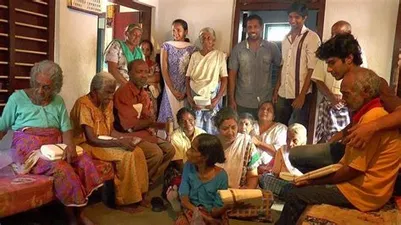


India is a country that has a complex relationship with its prisoners. On the one hand, it has a long history of incarceration and punishment as a form of justice. There are growing concerns about the treatment of prisoners in India and the challenges they face when it comes to reintegration into society. In this article, we will explore the issue of acceptance of prisoners in Indian society and examine the arguments for and against it.
The state of prisons in India
The prison system in India is overburdened and underfunded, with many prisons operating at double or triple their capacity. There are numerous issues with the prison system, including overcrowding, lack of resources, and poor conditions. According to the National Crime Records Bureau, there were over 4 lakh prisoners in India as of 2019, with 70% of them being undertrials. The prison population in India is also disproportionately made up of marginalized communities.
Reasons for resistance to acceptance of prisoners in Indian society
There are several reasons why Indian society may be resistant to accepting prisoners. One of the primary concerns is safety. Many people believe that prisoners are dangerous and that they pose a threat to society. This is particularly true in cases of violent crimes, where there may be a fear that the offender will reoffend if they are released into the community.
One of the key challenges in the restoration of released prisoners to society is the stigma and discrimination they face upon release. Even after serving their time in prison, many ex-offenders face difficulties in finding employment, housing, and social support. This can lead to a cycle of poverty and social exclusion, which can increase the likelihood of recidivism.
The lack of acceptance from family, friends, and community members can be a significant barrier to their success and well-being. This can lead to feelings of isolation and hopelessness, which can increase the likelihood of negative outcomes such as suicide.
The majority of ex-offenders face acceptance issues from their families, relatives, and neighbours upon reentry into society. Many ex-convicts end up committing suicide due to lack of acceptance from society or their families, or because they do not have a place to stay. These family acceptance issues have caused several ex-convicts to take their own lives. It is unfortunate that people lose their lives in this way, after being incarcerated and punished.
Almost everyone who leaves prison wants to start anew and become a better person, but unfortunately, this is not always possible.
Finally, there is the practical concern of reintegrating prisoners into society. Many prisoners in India have been incarcerated for years or even decades, and they may have difficulty adjusting to life outside of prison. They may lack the skills or resources necessary to find employment or housing, and they may struggle to form social connections with others.
Indian justice aims to punish offenders in order to reform them and turn them into good human beings who can contribute positively to society. However, after their punishment period is over, there is very little chance that society will accept them as reformed individuals. Few people think about the reformation of convicts or the root causes of crime in society. As human beings, we should question why someone became an offender in the first place, and work towards addressing those underlying issues.
Arguments for acceptance of prisoners in Indian society
Despite the concerns outlined above, there are strong arguments for accepting prisoners into Indian society. One of the primary arguments is that acceptance is necessary for the rehabilitation of prisoners. If we want prisoners to be able to reintegrate into society and lead productive lives, we need to provide them with the resources and support necessary to do so. This may include education and job training programmes, mental health counseling, and other forms of support.
Acceptance of prisoners in Indian society is also important for reducing recidivism. When prisoners are released from prison without adequate support or resources, they are more likely to reoffend and end up back in prison. By providing prisoners with the resources they need to reintegrate into society, we can reduce the likelihood that they will reoffend and increase the chances that they will lead productive lives.
Finally, acceptance of prisoners in Indian society is important for promoting social justice. Many prisoners in India come from marginalized communities, and they may have been incarcerated due to systemic issues such as poverty, casteism, or discrimination. By providing prisoners with the resources and support necessary to reintegrate into society, we can help address some of these underlying issues and reduce the likelihood of future criminal behaviour.
Society must acknowledge the human face of prisoners and recognize that they too have the potential to contribute to society in meaningful ways.
To truly achieve acceptance of prisoners in Indian society, there needs to be a shift in the way we think about punishment and justice. We need to move away from a punitive approach and towards a more restorative approach that focuses on rehabilitation and reintegration. This will require significant investments in education, job training, mental health services, and other forms of support to ensure that prisoners have the tools they need to succeed once they are released.
A society is a group of individuals who share a common culture, values, and social norms. However, we are all members of society. All individuals together form a society. There is no specific group called ‘society’. The question remains: as individuals, do we accept ex-offenders after they have served their prison sentence? This is a complex issue with no easy answer.
In conclusion, accepting prisoners into Indian society is not only the right thing to do, it is also the smart thing to do. By providing prisoners with the resources and support they need to reintegrate into society, we can help reduce crime, promote social justice, and create a more vibrant and inclusive society for all. It is time to end the stigma and fear associated with prisoners and to start treating them as human beings deserving of dignity and respect.

Arunbalaji Selvaraj works for tribal empowerment and serves across the spectrum in the domain of free education for marginalised communities. He is a Technical Delivery Manager at Dell-EMC , Bangalore.